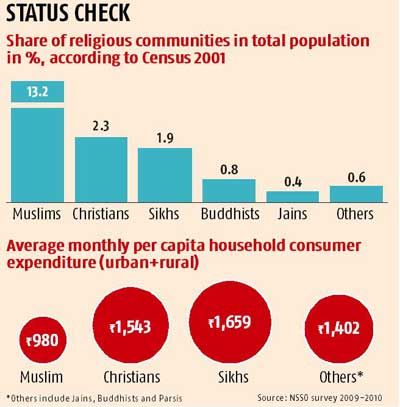 Tenants dwelling in prime properties of Jain temples for years may have to vacate these; government interference in institutions and trusts of the community will cease to exist; and there will be 50 per cent reservation for Jain students in colleges run by the community: These are the immediate benefits resulting from the accordance of minority status to Jains.
Tenants dwelling in prime properties of Jain temples for years may have to vacate these; government interference in institutions and trusts of the community will cease to exist; and there will be 50 per cent reservation for Jain students in colleges run by the community: These are the immediate benefits resulting from the accordance of minority status to Jains.
The community, which comprises only a fraction of India’s population, now stands at a par with five other minority communities -- Muslims, Sikhs, Christians, Buddhists and Parsis. It will avail of exclusive schemes run by the ministry of minority affairs.
“One should not confuse the issue of minority status with that of reservation in jobs and education institutes such as Indian Institutes of Technology and Indian Institutes of Management.
The latter is only for people who fall under the categories of scheduled castes, scheduled tribes and Other Backward Classes. Jains are financially sound and most of them are out of these categories,” says A K Jain, founder of city-based Ahimsa Foundation.
“The only benefit we will have is the government won’t be able to interfere in our daily function of running trusts and temples, which have enormous wealth in terms of cash and properties.
"The Archeological Survey of India wanted to bring down some of our temples; now, it can’t do much,” says Jain, a charted accountant.
Other benefits the community’s institutions may avail of include exemption from rent control laws.
It can seek legal recourse to evict tenants who have housed their properties for years and pay a meagre rent.
Besides, Jains can teach culture and religion in their institutions and seek government funding for land.
There are about five million Jains in India, mostly in Maharashtra, Rajasthan, Madhya Pradesh, Gujarat, Karnataka, Uttar Pradesh and Delhi.
Though 11 states have given the minority community status, for the past six decades, Jains have been demanding the Union government, too, do so.
| Some of the schemes for minorities |
|
After many twists, turns and legal hurdles, the move was finally cleared by the Union cabinet on Monday.
 Many believe this is a pre-election dole and the Congress is likely to gain from it during the coming Lok Sabha elections. Jain community leaders said Jains had never exercised political influence, though they welcomed this decision with an open mind.
Many believe this is a pre-election dole and the Congress is likely to gain from it during the coming Lok Sabha elections. Jain community leaders said Jains had never exercised political influence, though they welcomed this decision with an open mind.
Wajahat Habibullah, chairperson of the National Commission for Minorities, says his organisation has always supported the demand for grant of minority status to Jains.
“Every community has a distinct problem. With Muslims, it is education; for Buddhists, it is the reorganisation of their places of worship in different part of the country; for Jains, it is their religious places and temples,” he adds.
“Most Jains don’t need scholarships because they are financially sound. It will not create a major difference to other communities.”
The literacy rate among Jains is about 90 per cent.
The Muslim community has been the major beneficiary of scholarships from the ministry for minority affairs (which account for most of the ministry’s annual budget of about Rs 3,000 crore (Rs 30 billion), as their population is the highest among minority communities.












 © 2025
© 2025